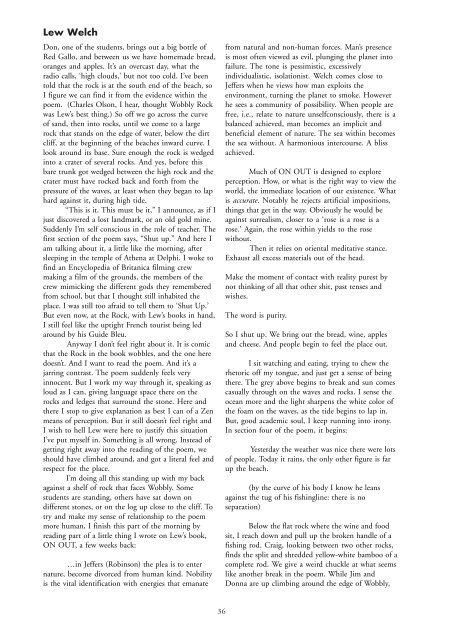Create successful ePaper yourself
Turn your PDF publications into a flip-book with our unique Google optimized e-Paper software.
Lew Welch<br />
Don, one of the students, brings out a big bottle of<br />
Red Gallo, and between us we have homemade bread,<br />
oranges and apples. It’s an overcast day, what the<br />
radio calls, ‘high clouds,’ but not too cold. I’ve been<br />
told that the rock is at the south end of the beach, so<br />
I figure we can find it from the evidence within the<br />
poem. (Charles Olson, I hear, thought Wobbly Rock<br />
was Lew’s best thing.) So off we go across the curve<br />
of sand, then into rocks, until we come to a large<br />
rock that stands on the edge of water, below the dirt<br />
cliff, at the beginning of the beaches inward curve. I<br />
look around its base. Sure enough the rock is wedged<br />
into a crater of several rocks. And yes, before this<br />
bare trunk got wedged between the high rock and the<br />
crater must have rocked back and forth from the<br />
pressure of the waves, at least when they began to lap<br />
hard against it, during high tide.<br />
“This is it. This must be it,” I announce, as if I<br />
just discovered a lost landmark, or an old gold mine.<br />
Suddenly I’m self conscious in the role of teacher. The<br />
first section of the poem says, “Shut up.” And here I<br />
am talking about it, a little like the morning, after<br />
sleeping in the temple of Athena at Delphi. I woke to<br />
find an Encyclopedia of Britanica filming crew<br />
making a film of the grounds, the members of the<br />
crew mimicking the different gods they remembered<br />
from school, but that I thought still inhabited the<br />
place. I was still too afraid to tell them to ‘Shut Up.’<br />
But even now, at the Rock, with Lew’s books in hand,<br />
I still feel like the uptight French tourist being led<br />
around by his Guide Bleu.<br />
Anyway I don’t feel right about it. It is comic<br />
that the Rock in the book wobbles, and the one here<br />
doesn’t. And I want to read the poem. And it’s a<br />
jarring contrast. The poem suddenly feels very<br />
innocent. But I work my way through it, speaking as<br />
loud as I can, giving language space there on the<br />
rocks and ledges that surround the stone. Here and<br />
there I stop to give explanation as best I can of a Zen<br />
means of perception. But it still doesn’t feel right and<br />
I wish to hell Lew were here to justify this situation<br />
I’ve put myself in. Something is all wrong. Instead of<br />
getting right away into the reading of the poem, we<br />
should have climbed around, and got a literal feel and<br />
respect for the place.<br />
I’m doing all this standing up with my back<br />
against a shelf of rock that faces Wobbly. Some<br />
students are standing, others have sat down on<br />
different stones, or on the log up close to the cliff. To<br />
try and make my sense of relationship to the poem<br />
more human, I finish this part of the morning by<br />
reading part of a little thing I wrote on Lew’s book,<br />
ON OUT, a few weeks back:<br />
…in Jeffers (Robinson) the plea is to enter<br />
nature, become divorced from human kind. Nobility<br />
is the vital identification with energies that emanate<br />
from natural and non-human forces. Man’s presence<br />
is most often viewed as evil, plunging the planet into<br />
failure. The tone is pessimistic, excessively<br />
individualistic, isolationist. Welch comes close to<br />
Jeffers when he views how man exploits the<br />
environment, turning the planet to smoke. However<br />
he sees a community of possibility. When people are<br />
free, i.e., relate to nature unselfconsciously, there is a<br />
balanced achieved, man becomes an implicit and<br />
beneficial element of nature. The sea within becomes<br />
the sea without. A harmonious intercourse. A bliss<br />
achieved.<br />
Much of ON OUT is designed to explore<br />
perception. How, or what is the right way to view the<br />
world, the immediate location of our existence. What<br />
is accurate. Notably he rejects artificial impositions,<br />
things that get in the way. Obviously he would be<br />
against surrealism, closer to a ‘rose is a rose is a<br />
rose.’ Again, the rose within yields to the rose<br />
without.<br />
Then it relies on oriental meditative stance.<br />
Exhaust all excess materials out of the head.<br />
Make the moment of contact with reality purest by<br />
not thinking of all that other shit, past tenses and<br />
wishes.<br />
The word is purity.<br />
So I shut up. We bring out the bread, wine, apples<br />
and cheese. And people begin to feel the place out.<br />
I sit watching and eating, trying to chew the<br />
rhetoric off my tongue, and just get a sense of being<br />
there. The grey above begins to break and sun comes<br />
casually through on the waves and rocks. I sense the<br />
ocean more and the light sharpens the white color of<br />
the foam on the waves, as the tide begins to lap in.<br />
But, good academic soul, I keep running into irony.<br />
In section four of the poem, it begins:<br />
Yesterday the weather was nice there were lots<br />
of people. Today it rains, the only other figure is far<br />
up the beach.<br />
(by the curve of his body I know he leans<br />
against the tug of his fishingline: there is no<br />
separation)<br />
Below the flat rock where the wine and food<br />
sit, I reach down and pull up the broken handle of a<br />
fishing rod. Craig, looking between two other rocks,<br />
finds the split and shredded yellow-white bamboo of a<br />
complete rod. We give a weird chuckle at what seems<br />
like another break in the poem. While Jim and<br />
Donna are up climbing around the edge of Wobbly,<br />
36





